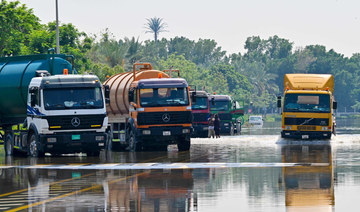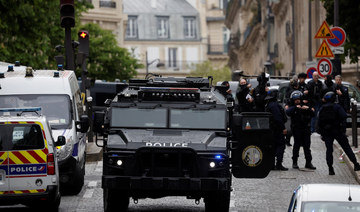ALEPPO, Syria: Aleppo’s largest square was packed with people of all ages: young men performing a folk dance, children playing, others buying ice cream, popcorn, peanuts and salted pumpkin seeds. A giant sign spells out in colorful English letters, “I love Aleppo.”
The scene in Saadallah Al-Jabiri Square on a recent day was a complete turnaround from what it was during nearly four years of warfare that wracked the Syrian city. Rebel sniper fire and shelling — and a triple car bombing that killed dozens — made it a no-go zone. For much of the fighting, the square stood near the front line dividing the government-held western half of Aleppo from the rebel-held eastern half.
Thirteen months after government forces captured the east, crushing rebels, there have been some improvements in Aleppo. The guns are silent, allowing life to return to the streets. Water and electricity networks are improving. But the city has barely begun to recover from devastation so great and a civilian flight so big that residents find it difficult to imagine it could ever return to what it was.
Aleppo’s eastern half remains in ruins. Its streets have been cleared of rubble but there’s been little rebuilding of the blocks of destroyed or badly damaged buildings. Though some residents have trickled back, hundreds of thousands still have not returned to their homes in the east, either because their homes are wrecked or because they fear reprisals for their opposition loyalties.
Also, after the victory by the forces of President Bashar Assad, there’s little sign of attempts at reconciliation in Syria’s largest city or talk of how part of the city rose up trying to bring down Assad’s rule. To reporters, residents — whether out of genuine sentiment or fear of state reprisals — express only pro-Assad sentiment and dismiss the rebels as Islamic militants backed by foreign powers. Die-hard opposition sympathizers likely have not returned or keep it to themselves, and everyone is more focused on grappling with the destruction in the city.
“I feel very sad, I cry. Sometimes I cry in the morning because this was a very good neighborhood,” said Adnan Sabbagh, standing on a balcony in his building in the once rebel-held eastern district of Sukkari.
The view from his balcony is a landscape of wreckage. Across the street is a pile of rubble a block long that used to be the Ein Jalout school compound that his three daughters and two sons once attended. Beyond it stand apartment buildings that have been sheared in half, their internal staircases jutting out exposed. The building adjacent to Sabbagh’s has been levelled to a hill of broken concrete, rebar and stone.
Sabbagh’s own six-story building still stands but the top three floors have had all their walls blasted away, leaving slabs of concrete floor dangling precariously.
The 47-year-old construction worker fled to live in the coastal town of Jableh five years ago as soon as the rebels overran Aleppo’s east. All three of his daughters are married to soldiers in Assad’s army, so he feared the fighters would not tolerate his presence.
In the autumn of last year, he returned home and fixed up his apartment on the second floor where he now lives with his wife and youngest son, Hamza. He relies on generators set up in the neighborhood because like most other parts of east Aleppo, there’s no electricity in Sukkari — the government is still working to reinstall electricity poles. But running water has been restored — though it’s available only every other day, as is the case throughout the city east and west.
Aleppo, with a pre-war population of 2.3 million, was Syria’s largest city and its commercial center. More than that, it was a culture all its own within Syria. Aleppans take enormous pride in their own accent of Syrian Arabic and their city’s famed cuisine with its own styles of roast meats and mezze appetizers. The city’s history spans millennia, and tourists were drawn by its historic citadel, Ummayad Mosque and covered bazaar.
But it became one of the most vicious battlegrounds of Syria’s still ongoing war.
In July 2012, rebels stormed eastern parts of the city where they found a welcome among many of its poorer residents. For the next few years, the opposition fighting Assad around the country saw their enclave in Aleppo as the jewel of their uprising, their strongest urban center. It tore Aleppo in two, however, with destructive battles between the two halves as tens of thousands fled the city.
In 2016, government forces backed by Russian airstrikes surrounded the enclave, besieging it for months, pounding it with barrages. By the end, the rebels and residents trapped with them in a shrinking area of neighborhoods faced either being crushed or starving. In December 2016, they surrendered. The rebels were sent to opposition territory elsewhere, while the few remaining residents were evacuated, leaving the eastern sector — once home to well over 1 million people — a shattered, empty shell.
Since then, some have filtered back. The top UN official in Syria, Ali Al-Za’tari, said the numbers are uncertain but that the UN is aware of close to 200,000 now living in the east, based on those who have registered for assistance.
Most of the factories in Aleppo’s 15 industrial districts are still closed, many of them damaged either from looting or from bombardment by government forces when they were held by rebels. Despite the relative peace, insurgents on Aleppo’s western outskirts fire shells occasionally. That has slowed the return of production at Lairamoun, an industrial district only few hundred meters (yards) from rebel positions.
Ghassan Nazi, owner of a textile factory in Lairamoun, said that once the rebels are pushed back, he will reopen his business. Touring the now silent factory, he said it was used as a prison by an Islamist rebel faction called the Badr Martyrs. He said he’s suffered some $5 million in losses.
He blames everything that tore apart his city on “neighboring countries” that he said plotted to destroy Aleppo as an economic engine. He didn’t say which countries but many government supporters use the phrase to refer to opposition-backer Turkey. “They simply want to turn us from producers to consumers,” he said.
In western Aleppo, where damage was much less, there’s a feeling of liberation from life under warfare. Power comes several hours a day and will soon run around the clock. Sand berms that had been set up on many streets have been removed, and security checkpoints have been pulled from the heart of the city to its entrances, freeing traffic.
Im El-Nour, a 51-year-old woman who drives a taxi — the only female cab driver in the city, she says — has seen a boost in work. She can now operate in the east, where conservative women call her for their errands to avoid riding with a male driver. El-Nour also works as a DJ at women-only parties or weddings, which have become more frequent now with the relative peace.
“One of the songs that I play a lot is Cheb Khaled’s Cest La Vie,” she said, referring to a popular Algerian singer. She added that Aleppo’s women also like to dance to Canadian singer Celine Dion, Shakira and Lebanon’s Najwa Karam.
Between her two jobs, El-Nour — who is divorced and who lost a son, killed while fighting as a soldier in Assad’s army — makes more than $100 a month, a bit more than a typical civil servant’s salary. “Aleppo will again become the jewel of the Middle East,” she boasted.
At Saadallah Al-Jabiri Square, Mustafa Khodor churned out popcorn as parents lined up to buy from him. He said his sales have tripled. “The liberation of Aleppo was a turning point for us in this city. People now feel safe and go out,” said the father of five.
Nearby, Abdullatif Maslawi, a 21-year-old law student, performed a traditional dance known as dabke with a group of his friends.
“Aleppo is my soul,” he said. “Aleppo was wounded and now it is being cured.”
Syria’s Aleppo still wrecked by war, more than a year later
Syria’s Aleppo still wrecked by war, more than a year later
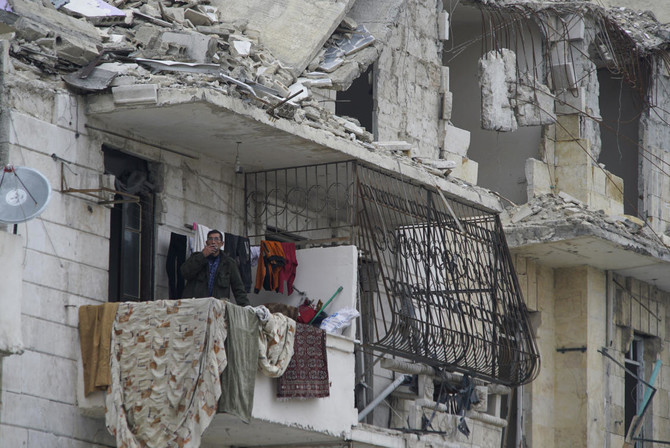
URGENT ¥¥¥ Israel says its forces kill 10 militants in West Bank raid
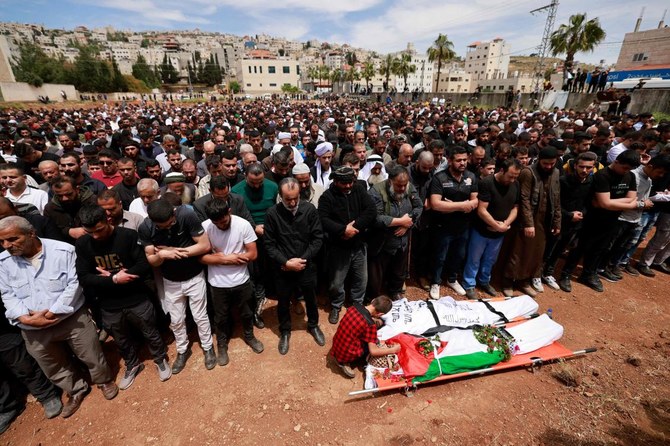
TULKARM, Palestinian Territories: The Israeli army said Saturday security forces killed 10 militants in an ongoing raid around Nur Shams, a refugee camp in the north of the occupied West Bank.
“Security forces eliminated 10 terrorists during encounters” over more than 40 hours, the army said in a statement.
Emirates and flydubai resume normal operations after Dubai floods
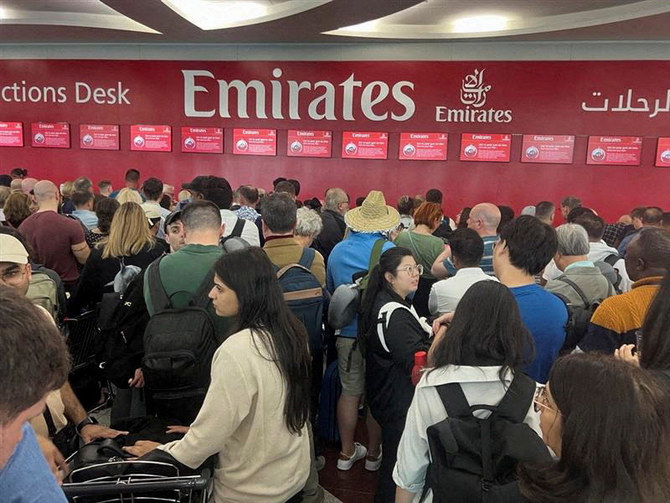
- Emirates canceled nearly 400 flights and delayed many more as a result of a record storm that hit the desert city of Dubai
RIYADH: Dubai’s flagship carrier Emirates and sister airline flydubai have restored normal operations after heavy rains caused severe flooding across the United Arab Emirates earlier this week, the airlines said on Saturday.
Emirates canceled nearly 400 flights and delayed many more as a result of a record storm that hit the desert city of Dubai on Tuesday, said a statement released by the airline’s president, Tim Clark.
Due to the impact of the storm, the airline suspended check-in for passengers departing from Dubai and halted its transit operations through Dubai International Airport, a major global travel hub, leaving thousands of travelers stranded.
The airport has struggled to return to normal operations after the storm flooded taxiways, forcing flight diversions, delays and cancelations.
Flydubai also returned to its full flight schedule from the airport’s Terminal 2 and Terminal 3 on Saturday following the weather-related disruption, a spokesperson for the airline said.
Clark said Emirates had provided 12,000 hotel rooms and 250,000 meal vouchers to customers who were affected. He added it would take days to clear the backlog of rebooked passengers.
The UAE has suffered the impact of the flooding for days, with roads between the city and Abu Dhabi still partially under water as of Saturday. In Abu Dhabi, some supermarkets and restaurants faced product shortages, unable to receive deliveries from Dubai.
Researchers have linked extreme weather events such as Tuesday’s storm to climate change and anticipate that global warming will lead to higher temperatures, increased humidity and a greater risk of flooding in parts of the Gulf region.
A lack of drainage infrastructure to cope with heavy rains in countries such as the UAE can put them at particular risk of flooding.
Israeli airstrike in southern Gaza city of Rafah kills at least 9 Palestinians, including 6 children
Israeli airstrike in southern Gaza city of Rafah kills at least 9 Palestinians, including 6 children
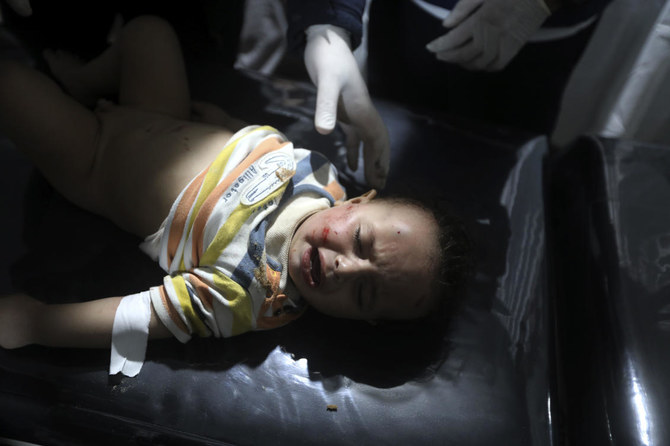
- Strike late Friday hit a residential building in the western Tel Sultan neighborhood of the city of Rafah
RAFAH, Gaza Strip: An Israeli airstrike on a house in Gaza’s southernmost city killed at least nine people, six of them children, hospital authorities said Saturday, as Israel pursued its nearly seven-month offensive in the besieged Palestinian territory.
Israel’s war against the Islamic militant group Hamas has led to a dramatic escalation of tensions in an already volatile Middle East.
The strike late Friday hit a residential building in the western Tel Sultan neighborhood of the city of Rafah, according to Gaza’s civil defense. The bodies of the six children, two women and a man were taken to Rafah’s Abu Yousef Al-Najjar hospital, the hospital’s records showed.
At the hospital, relatives cried and hugged the bodies of the children, wrapped in white shrouds, as others comforted them.
The fatalities included Abdel-Fattah Sobhi Radwan, his wife Najlaa Ahmed Aweidah and their three children, his brother-in-law Ahmed Barhoum said. Barhoum also lost his wife, Rawan Radwan, and their 5-year-old daughter Alaa.
“This is a world devoid of all human values and morals,” Barhoum told The Associated Press Saturday morning, crying as he cradled and gently rocked the body of Alaa in his arms. “They bombed a house full of displaced people, women and children. There were no martyrs but women and children.”
No victims were registered from a second overnight strike in the city.
Rafah, which lies on the border with Egypt, currently hosts more than half of Gaza’s total population of about 2.3 million people, the vast majority of whom have been displaced by fighting further north in the territory.
Despite calls for restraint from the international community, including Israel’s staunchest ally, the United States, the Israeli government has insisted for months that it intends to push a ground offensive into the city, where it says many of the remaining Hamas militants are holed up.
Such a ground operation has not materialized so far, but the Israeli military has repeatedly carried out airstrikes on and around the city.
The war was sparked by an unprecedented raid into southern Israel by Hamas and other militant groups on Oct. 7 that left about 1,200 people dead, the vast majority of them civilians, and saw about 250 people kidnapped and taken into Gaza. Israel says about 130 hostages remain in Gaza, although more than 30 have been confirmed to now be dead, either killed on Oct. 7 or having died in captivity.
The Gaza Health Ministry said Saturday the bodies of 37 people killed by Israeli strikes were brought to hospitals in Gaza over the past 24 hours. Hospitals also received 68 wounded, it said. The latest figures bring the overall Palestinian death toll from the Israel-Hamas war to at least 34,049, and the number of wounded to 76,901, the ministry said. Although the Hamas-run health authorities do not differentiate between combatants and civilians in their count, they say at least two thirds have been children and women.
The war has sent regional tensions spiraling, leading to a dramatic eruption of violence between Israel and its archenemy Iran that threatened to escalate into a full-blown war.
On Friday, both Iran and Israel played down an apparent Israeli airstrike near a major air base and nuclear site in central Iran, indicating the two sides were pulling back from what could have become an all-out conflict. Over the past several weeks, an alleged Israeli strike killed two Iranian generals at an Iranian consulate in Syria and was followed by an unprecedented Iranian missile barrage on Israel.
Israel has also faced off with the Hezbollah militant group, an Iranian proxy operating from Lebanon, with the two sides there frequently trading rocket and drone attacks across the Lebanese-Israeli border. Yemen’s Iran-backed Houthi rebels have also joined the fray, launching strikes against merchant ships in the Red Sea and the Gulf of Aden in what they say is a campaign of solidarity with the Palestinians in Gaza.
Tension has also been high in the occupied West Bank, where an Israeli military raid Friday in the Nur Shams refugee camp killed at least four Palestinians, including three militants, according to the Israeli military, Palestinian health officials and a militant group.
Palestinian health authorities said one of those killed was a 15-year-old boy shot dead by Israeli fire. The Islamic Jihad militant group confirmed the deaths of three members, including one who it said was a local military commander. The Israeli military said four Israeli soldiers were slightly wounded in the operation.
Saraya Al-Quds, the military arm of Islamic Jihad, said its fighters had engaged in heavy gunbattles Saturday morning with Israeli forces in the town of Tulkarem, adjacent to Nur Shams. No further details were immediately available. Residents in Tulkarem went went on a general strike Saturday to protest the attack on Nur Shams, with shops, restaurants and government offices all closed.
Since the Oct. 7 Hamas attack on southern Israel, more than 460 Palestinians have been killed by Israeli fire in the West Bank, Palestinian health officials say. Israel stages frequent raids into towns and cities in the volatile territory. The dead have included militants, but also stone-throwers and bystanders. Some have also been killed in attacks by Israeli settlers.
Iran FM downplays reported Israeli retaliation

- Israeli officials have made no public comment on what happened Friday
- Overnight last Saturday-Sunday Iran launched its first-ever direct attack on Israeli territory
Tehran: Iran’s foreign minister has dismissed as akin to child’s play the reported Israeli retaliation for an unprecedented Iranian strike, and said Tehran would not respond unless Iranian “interests” were targeted.
On Friday, Iran’s state media reported explosions were heard after, according to an official, small drones were successfully shot down.
Media in the United States quoted officials there as saying Israel had carried out strikes in retaliation for Tehran’s drone and missile barrage fired at Israel last weekend.
“What happened last night was no attack,” Foreign Minister Hossein Amir-Abdollahian told NBC News in a Friday interview.
“It was the flight of two or three quad-copters, which are at the level of toys that our children use in Iran.”
He added that, “As long as there is no new adventure on behalf of the Israeli regime against Iran’s interests, we will have no response.”
Friday’s explosions prompted world leaders to appeal for calm and de-escalation with fears of wider conflict against the backdrop of the war in Gaza which began on October 7.
Overnight last Saturday-Sunday Iran launched its first-ever direct attack on Israeli territory. The barrage was in response to a deadly April 1 air strike on Tehran’s consulate in Damascus, which Iran blamed on Israel.
The Israeli army said the vast majority of the more than 300 missiles and drones fired by Iran were shot down — with the help of the United States and other allies — and that the attack caused only minimal damage.
Israeli officials have made no public comment on what happened Friday, and analysts said both sides are looking to de-escalate, for now.
“If the Israeli regime intends to take another action against our interests, our next response will be immediate and to the maximum,” Amir-Abdollahian said in the interview.
Tehran plays down reported Israeli attacks, signals no further retaliation
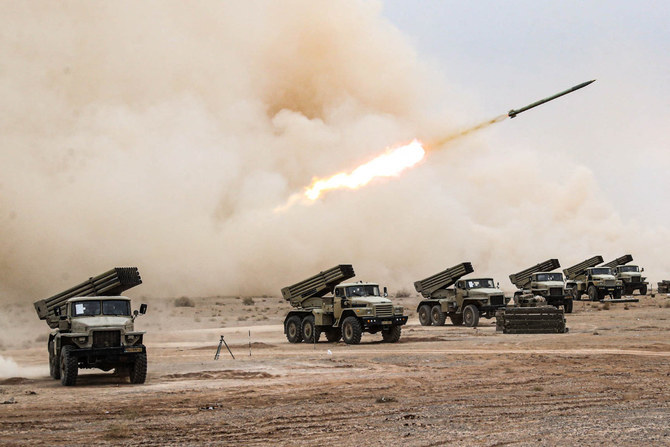
- United States received advance notice of Israel’s reported strike on Iran, reports US media
- Countries around the world called on both sides to avert further escalation amid tensions
DUBAI/JERUSALEM: Explosions echoed over an Iranian city on Friday in what sources described as an Israeli attack, but Tehran played down the incident and indicated it had no plans for retaliation — a response that appeared gauged toward averting region-wide war.
The limited scale of the attack and Iran’s muted response both appeared to signal a successful effort by diplomats who have been working round the clock to avert all-out war since an Iranian drone and missile attack on Israel last Saturday.
Iranian media and officials described a small number of explosions, which they said resulted from Iran’s air defenses hitting three drones over the city of Isfahan. Notably, they referred to the incident as an attack by “infiltrators,” rather than by Israel, obviating the need for retaliation.
An Iranian official said there were no plans to respond against Israel for the incident.
“The foreign source of the incident has not been confirmed. We have not received any external attack, and the discussion leans more toward infiltration than attack,” the official said.
Israel said nothing about the incident. It had said for days it was planning to retaliate against Iran for Saturday’s strikes, the first ever direct attack on Israel by Iran in decades of shadow war waged by proxies which has escalated throughout the Middle East through six months of battle in Gaza.
The United States received advance notice of Israel’s reported strike on Iran but did not endorse the operation or play any part in its execution, US media quoted officials as saying.
NBC and CNN, citing sources familiar with the matter and a US official, respectively, said Israel had provided Washington with pre-notification of the strike.
Various networks cited officials confirming a strike had taken place inside Iran, with CNN quoting one official as stating the target was not a nuclear facility.
The two longstanding foes had been heading toward direct confrontation since a presumed Israeli airstrike on April 1 that destroyed a building in Iran’s embassy compound in Damascus and killed several Iranian officers including a top general.
Iran’s response, with a direct attack on Israel, was unprecedented but caused no deaths and only minor damage because Israel and its allies shot down hundreds of missiles and drones.
Allies including the United States had since been pressing hard to ensure any further retaliation would be calibrated not to provoke a spiral of hostilities. The British and German foreign ministers visited Jerusalem this week, and Western countries tightened sanctions on Iran to mollify Israel.
In a sign of pressure within Israel’s hard-right government for a stronger response, Itamar Ben Gvir, the far-right national security minister tweeted a single word after Friday’s strikes: “Feeble!.”
Countries around the world called on Friday for both sides to avert further escalation.
“It is absolutely necessary that the region remains stable and that all sides restrain from further action,” EU Commission head Ursula von der Leyen said. Similar calls came from Beijing and from Arab states in the region.
In financial markets, global shares eased, oil prices surged and US bond yields fell as traders worried about the risks.
NO MENTION OF ISRAEL
Within Iran, news reports on Friday’s incident made no mention of Israel, and state television carried analysts and pundits who appeared dismissive about the scale.
An analyst told state TV that mini drones flown by “infiltrators from inside Iran” had been shot down by air defenses in Isfahan.
Shortly after midnight, “three drones were observed in the sky over Isfahan. The air defense system became active and destroyed these drones in the sky,” Iranian state TV said.
Senior army commander Siavosh Mihandoust was quoted by state TV as saying air defense systems had targeted a “suspicious object.”
Iranian President Ebrahim Raisi had warned Israel before Friday’s strike that Tehran would deliver a “severe response” to any attack on its territory.
Iran told the United Nations Security Council on Thursday that Israel “must be compelled to stop any further military adventurism against our interests” as the UN secretary-general warned that the Middle East was in a “moment of maximum peril.”
By morning, Iran had reopened airports and airspace that were shut during the strikes.
Still, there was alarm over security in Israel and elsewhere. The US Embassy in Jerusalem restricted US government employees from travel outside Jerusalem, greater Tel Aviv and Beersheba “out of an abundance of caution.”
In a statement, the embassy warned US citizens of a “continued need for caution and increased personal security awareness as security incidents often take place without warning.”
Israel’s assault on Gaza began after Hamas Islamists attacked Israel on Oct. 7, killing 1,200, according to Israeli tallies. Israel’s military offensive has killed about 34,000 Palestinians in Gaza, according to the Gazan health ministry.
Iran-backed groups have declared support for Palestinians, carrying out attacks from Lebanon, Yemen and Iraq, raising fears the Gaza conflict could grow into a wider regional war.



